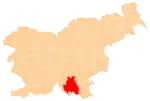Kočevje
| |
|---|---|
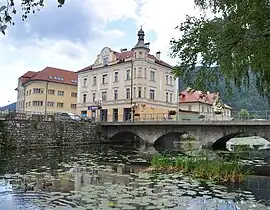 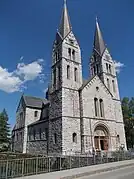 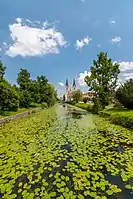 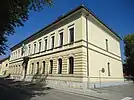 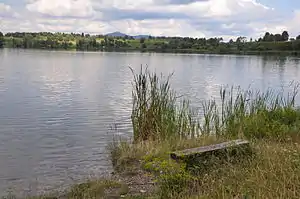 From top, left to right: Town center, Saint Bartholomew Church, Rinža River, Gymnasium, Kočevje Lake | |
 Coat of arms | |
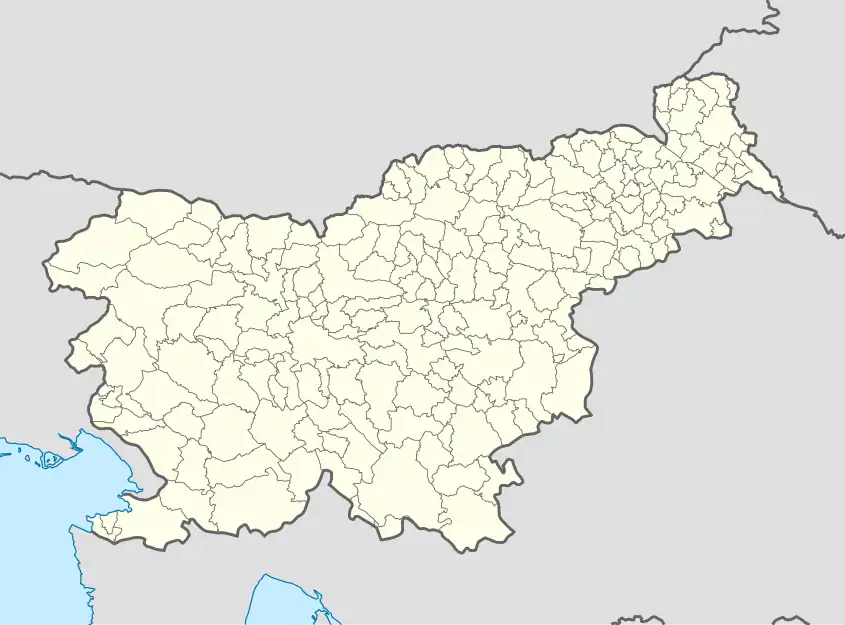 Kočevje Location of the City of Kočevje in Slovenia | |
| Coordinates: 45°38′34.66″N 14°51′33.78″E / 45.6429611°N 14.8593833°E | |
| Country | |
| Government | |
| • Mayor | Vladimir Prebilič |
| Area | |
| • Total | 14.14 km2 (5.46 sq mi) |
| Elevation | 465 m (1,526 ft) |
| Population (2021)[2] | |
| • Total | 8,113 |
| Time zone | UTC+01 (CET) |
| • Summer (DST) | UTC+02 (CEST) |
| Vehicle registration | LJ |
Kočevje (pronounced [kɔˈtʃeːwjɛ] ⓘ; German: Gottschee;[3] Göttscheab or Gətscheab in the local Gottscheerish dialect; Italian: Cocevie) is a town and the seat of Municipality of Kočevje in southern Slovenia.
Geography


The town is located at the foot of the Kočevski Rog karst plateau on the Rinža River in the historic Lower Carniola region. It is now part of the Southeast Slovenia Statistical Region.[4] The Rinža River flows through the town. Lake Kočejve, a former open-pit coal mine, lies northeast of the town center.
Climate
Kočevje features a humid continental climate (Dfb/Cfb).
| Climate data for Kočevje (467 m elev.) [1948-2022] | |||||||||||||
|---|---|---|---|---|---|---|---|---|---|---|---|---|---|
| Month | Jan | Feb | Mar | Apr | May | Jun | Jul | Aug | Sep | Oct | Nov | Dec | Year |
| Record high °C (°F) | 18.4 (65.1) |
21.4 (70.5) |
24.5 (76.1) |
28.7 (83.7) |
31.9 (89.4) |
36.0 (96.8) |
36.8 (98.2) |
38.1 (100.6) |
32.6 (90.7) |
27.2 (81.0) |
23.5 (74.3) |
16.0 (60.8) |
38.1 (100.6) |
| Mean daily maximum °C (°F) | 3.39 (38.10) |
5.73 (42.31) |
9.99 (49.98) |
14.66 (58.39) |
19.63 (67.33) |
23.33 (73.99) |
25.57 (78.03) |
25.17 (77.31) |
20.8 (69.4) |
15.39 (59.70) |
8.9 (48.0) |
4.03 (39.25) |
14.72 (58.48) |
| Daily mean °C (°F) | −1.16 (29.91) |
0.36 (32.65) |
3.9 (39.0) |
8.44 (47.19) |
13.14 (55.65) |
16.8 (62.2) |
18.42 (65.16) |
17.72 (63.90) |
13.77 (56.79) |
9.27 (48.69) |
4.55 (40.19) |
0.07 (32.13) |
8.77 (47.79) |
| Mean daily minimum °C (°F) | −5.31 (22.44) |
−4.34 (24.19) |
−1.25 (29.75) |
2.77 (36.99) |
7.01 (44.62) |
10.66 (51.19) |
11.96 (53.53) |
11.69 (53.04) |
8.46 (47.23) |
4.74 (40.53) |
0.75 (33.35) |
−3.54 (25.63) |
3.63 (38.54) |
| Record low °C (°F) | −29.2 (−20.6) |
−31.2 (−24.2) |
−26.4 (−15.5) |
−14.0 (6.8) |
−6.9 (19.6) |
−0.6 (30.9) |
2.6 (36.7) |
1.6 (34.9) |
−3.1 (26.4) |
−7.7 (18.1) |
−20.2 (−4.4) |
−23.4 (−10.1) |
−31.2 (−24.2) |
| Average precipitation mm (inches) | 94.32 (3.71) |
97.65 (3.84) |
97.49 (3.84) |
119.25 (4.69) |
124.95 (4.92) |
139.34 (5.49) |
120.45 (4.74) |
126.34 (4.97) |
151.72 (5.97) |
151.25 (5.95) |
156.54 (6.16) |
124.11 (4.89) |
1,503.41 (59.17) |
| Average extreme snow depth cm (inches) | 30.03 (11.82) |
33.16 (13.06) |
24.85 (9.78) |
6.35 (2.50) |
4.4 (1.7) |
0.0 (0.0) |
0.0 (0.0) |
0.0 (0.0) |
trace | 4.4 (1.7) |
13.98 (5.50) |
22.04 (8.68) |
33.16 (13.06) |
| Average precipitation days (≥ 0.1 mm) | 12.43 | 12.09 | 12.5 | 14.73 | 15.0 | 15.03 | 12.22 | 11.65 | 12.04 | 13.06 | 14.39 | 13.68 | 158.82 |
| Average rainy days (≥ 0.1 mm) | 7.2 | 6.91 | 9.14 | 14.01 | 14.91 | 15.01 | 12.21 | 11.61 | 12.0 | 12.89 | 13.01 | 9.46 | 138.36 |
| Average snowy days (≥ 0.1 mm) | 7.11 | 6.7 | 5.2 | 2.08 | 0.17 | 0.0 | 0.0 | 0.0 | 0.0 | 0.28 | 2.73 | 6.26 | 30.53 |
| Average relative humidity (%) | 84.09 | 80.48 | 76.66 | 74.21 | 73.75 | 74.72 | 74.37 | 76.3 | 79.99 | 81.97 | 85.13 | 86.65 | 79.03 |
| Average afternoon relative humidity (%) | 75.26 | 65.7 | 58.35 | 54.21 | 53.93 | 55.3 | 52.71 | 53.57 | 58.61 | 63.86 | 73.53 | 79.5 | 62.04 |
| Source: National Meteorological Service of Slovenia – Archive[5] | |||||||||||||
Name
Kočevje was attested in written sources in 1363 as Gotsche (and as Gotsew in 1386, Kotsche in 1425, and propre Koczeuiam in 1478). The name is derived from *Hvojčevje (from hvoja 'fir, spruce'), referring to the local vegetation. The initial hv- changed to k- under the influence of German phonology. Older discredited explanations include derivation from the hypothetical common noun *kočevje 'nomadic settlement' and Slovene koča 'shack'.[6] The former German name was Gottschee.[3]
History
In 1247 Berthold, Patriarch of Aquileia, granted the area around Ribnica within the imperial March of Carniola to the Carinthian counts of Ortenburg. When the counts had received further estates in 1336 on the wooded plateau down to Kostel on the Kolpa River from the hands of Patriarch Bertram, they called for German-speaking settlers from Carinthia and Tyrol. In the following decades they established the town of Gottschee, which was first mentioned in a 1363 deed. The settlement received market rights in 1377 and town privileges in 1471.
Until 1918, the town was part of the Austrian Empire (and part of Cisleithania after the Austro-Hungarian Compromise of 1867), in the district of the same name, as one of the 11 Bezirkshauptmannschaften in province of Carniola.[7] The German name alone was used by the post office before 1867.[8]
After the Second World War, a Yugoslav labor camp for political prisoners operated in Kočevje until March 1946.[9]
Germans of Kočevje
They first settled in Carniola around 1330 from the German lands of Tyrol and Carinthia and maintained their German identity and language during their 600 years of isolation. They cleared the vast forests of the region and established villages and towns. In 1809, they resisted French occupation in the 1809 Gottscheer Rebellion. With the end of the Habsburg monarchy in 1918, Gottschee became a part of the new Kingdom of Yugoslavia. The Gottscheer thus went from being part of the ruling ethnicity of Austria-Hungary (and the ruling group in the estates of the province of Carniola itself) to an ethnic minority in a large Slavic state. With the onset of the Second World War and the Invasion of Yugoslavia their situation was worsened further.
Landmarks
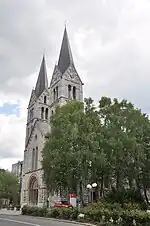
The parish church in the town is dedicated to Saint Bartholomew (Slovene: Sveti Jernej) and belongs to the Roman Catholic Diocese of Novo Mesto. It is a Neo-Romanesque building erected between 1887 and 1903 on the site of an earlier church.[10]
Notable people
Notable people that were born or lived in Kočevje include:
- Stane Jarm (1931–2011), sculptor, graphic artist and teacher (worked in Kočevje)
- Matej Bor (1913–1993), poet and author
- Milan Butina (1923–1999), academy-trained painter, art teacher, art theorist
- Ivan Jurkovič (born 1952), apostolic nuncio to Russia
- Zofka Kveder (1878–1926), writer
- Alois Loy (1860–1923), longtime mayor
- Viktor Parma (1858–1924), composer
- Roman Erich Petsche (1907–1993), teacher, painter, and Righteous Among the Nations
- Jože Šeško (1908–1942), secondary-school professor, social revolutionary, communist resistance fighter
- Franjo Uršič (1898–?), geologist, taught at the secondary school before the Second World War
Bibliography
- Gauß, Karl-Markus (2001). Die sterbenden Europäer. Unterwegs zu den Sepharden von Sarajevo, Gottscheer Deutschen, Arbëreshe, Sorben und Aromunen (in German). Vienna: Zsolnay. ISBN 3-552-05158-9.
References
- ↑ "Nadmorska višina naselij, kjer so sedeži občin" [Height above sea level of seats of municipalities] (in Slovenian and English). Statistical Office of the Republic of Slovenia. 2002. Archived from the original on 24 May 2013.
- ↑ "Prebivalstvo po naseljih, podrobni podatki, Slovenija, 1. januar 2021". stat.si (in Slovenian). Retrieved 12 May 2022.
- 1 2 Leksikon občin kraljestev in dežel zastopanih v državnem zboru (in Slovenian). Vol. 6: Kranjsko. Vienna: C. Kr. Dvorna in Državna Tiskarna. 1906. p. 36.
- ↑ "Občina Kočevje" (in Slovenian). Archived from the original on 29 November 2012.
- ↑ "meteo.si - Uradna vremenska napoved za Slovenijo - Državna meteorološka služba RS - Državna meteorološka služba". meteo.arso.gov.si (in Slovenian). Retrieved 26 July 2022.
- ↑ Snoj, Marko (2009). Etimološki slovar slovenskih zemljepisnih imen (in Slovenian). Ljubljana: Modrijan and Založba ZRC. p. 193.
- ↑ Klin, Wilhelm (1967). Die postalischen Abstempelungen auf den österreichischen Postwertzeichen-Ausgaben 1867, 1883 und 1890 (in German).
- ↑ Mueller, Edwin (1961). Handbook of Austria and Lombardy-Venetia Cancellations on the Postage Stamp Issues 1850–1864.
- ↑ Mrvič, Irena (1999). "Taborišče". Enciklopedija Slovenije (in Slovenian). Vol. 13 (Š–T). Ljubljana: Mladinska knjiga. pp. 177–179.
- ↑ "Republika Slovenija Ministrstvo za kulturo" [Slovenian Ministry of Culture register of national heritage reference number 1564] (in Slovenian). Archived from the original on 8 July 2012.
External links
 Media related to Kočevje at Wikimedia Commons
Media related to Kočevje at Wikimedia Commons- Kočevje on Geopedia
- Pre–World War II list of Kočevje residences, occupations, and family names (1–39)
- Pre–World War II list of Kočevje residences, occupations, and family names (40–140)
- Pre–World War II list of Kočevje residences, occupations, and family names (144–326)
- Pre–World War II list of Kočevje residences, occupations, and family names (332–344, unnumbered)

